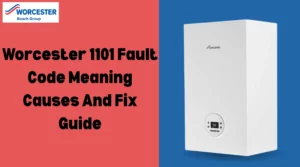Baxi E1 Error Code: What It Means and How to Fix It
If your Baxi boiler is showing the E1 error code, it usually means that the water pressure is too low. When this happens, your boiler will stop working to protect itself. The good news? It’s often an easy fix. You can usually solve the problem by topping up the water pressure in the boiler.

Table of contents
- What Is the Baxi E1 Fault Code on a Baxi Boiler?
- What Causes the Baxi E1 Fault Code?
- Other Common Error Codes with E1
- What If the Boiler Keeps Losing Pressure?
- How to Fix the Baxi E1 Error: Repressurize the Boiler
- When to Call a Gas Safe Engineer
- Do You Need a New Boiler?
- Final Thoughts
- Frequently Asked Questions
What Is the Baxi E1 Fault Code on a Baxi Boiler?
The E1 fault code is one of the most common problems seen in Baxi, Potterton, and Main boilers. It usually means there’s low water pressure, but sometimes it can point to other issues that may need a professional to check.
What Causes the Baxi E1 Fault Code?
1. Water Leak in the Heating System
A water leak is one of the main reasons for low boiler pressure. Over time, pipes or radiators can leak due to wear and tear. This causes the pressure to drop. What to do: Top up the boiler pressure using the filling loop. Check around pipes and radiators for damp spots or dripping water. If you find a leaking radiator, turn off its valves to stop the water.
2. Faulty Thermostat
Sometimes the thermostat may stop working properly and cause heating issues or low pressure. Check the following: Make sure the thermostat is connected to the boiler. Replace the batteries if they’re low. If it’s still not working, you may need a new thermostat.
Other Common Error Codes with E1
E119: Low water pressure – Top up the boiler to 1–2 bar.
E133: No gas supply – Check if the gas is on. Call a professional if needed.
E168: Electrical fault – Try resetting the boiler. If it doesn’t help, get expert help.
What If the Boiler Keeps Losing Pressure?
If your boiler keeps showing the E1 error even after you top up the pressure, there might be a bigger issue, such as:
- A hidden leak in the heating system
- A problem with the pressure relief valve
In these cases, it’s best to get help from a professional.
How to Fix the Baxi E1 Error: Repressurize the Boiler
Time needed: 5 minutes
Follow these simple steps to top up the pressure in your Baxi boiler:
- Find the filling loop
It’s a small silver hose under the boiler with two valves.
- Make sure valves are off
Both should be turned off to start with.
- Open the valves
Turn one fully, then slowly turn the second until the pressure gauge reaches 1.5 bar (in the green zone).
- Close the valves
Turn both valves off once the right pressure is reached.
- Important:
Never leave the valves open. This could lead to too much pressure and damage the boiler.
When to Call a Gas Safe Engineer
You should contact a Gas Safe registered engineer if:
- You see the E1 error repeatedly even after fixing the pressure
- You find leaks but can’t stop them
- The boiler shows other error codes like E133 or E168
- You hear unusual noises or smell gas
Gas engineers are trained to handle gas appliances safely. Don’t try to fix major issues yourself.
Do You Need a New Boiler?
The E1 error alone doesn’t mean your boiler is broken forever. But if the problem keeps coming back or you’re spending a lot on repairs, it might be time to consider a new boiler.
Final Thoughts
The Baxi boiler E1 Error code is mostly caused by low water pressure, and you can often fix it yourself by repressurizing the boiler. But if the problem keeps coming back, or you’re unsure what to do, don’t take risks—call a Gas Safe engineer to inspect the system safely. Regular maintenance and checks can help prevent future issues and keep your home warm and safe.
Frequently Asked Questions
If repressurizing the boiler does not clear the E1 error, it’s possible that there may be an underlying issue such as a gas supply fault (E133) or an electrical supply problem (E168). In this case, it is advisable to seek professional help from a qualified heating engineer.
Yes, a Baxi E1 fault code can sometimes indicate issues other than low water pressure, such as problems with the gas supply (E133) or electrical supply faults (E168). Each specific fault code can provide further insight into what might be causing the E1 error.
Regular maintenance of your Baxi boiler can help prevent E1 faults. This includes monitoring the pressure gauge to ensure the pressure is within the recommended range and addressing any issues promptly. It’s also a good idea to become familiar with the boiler’s user manual and perform routine inspections.



